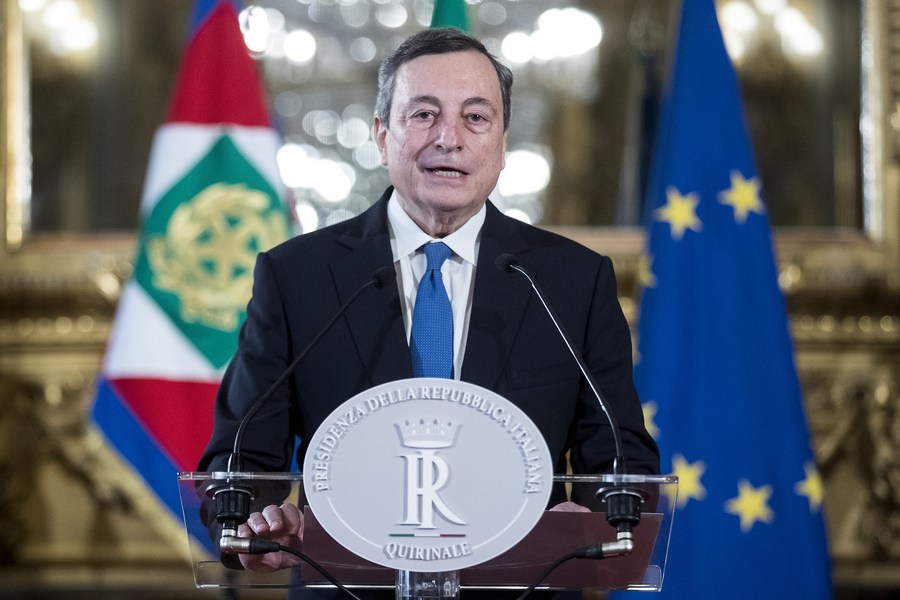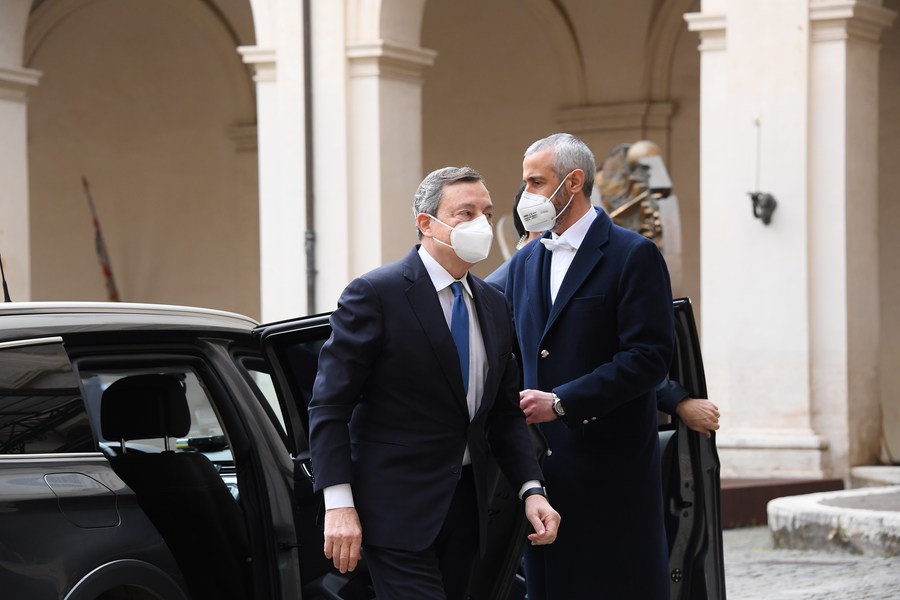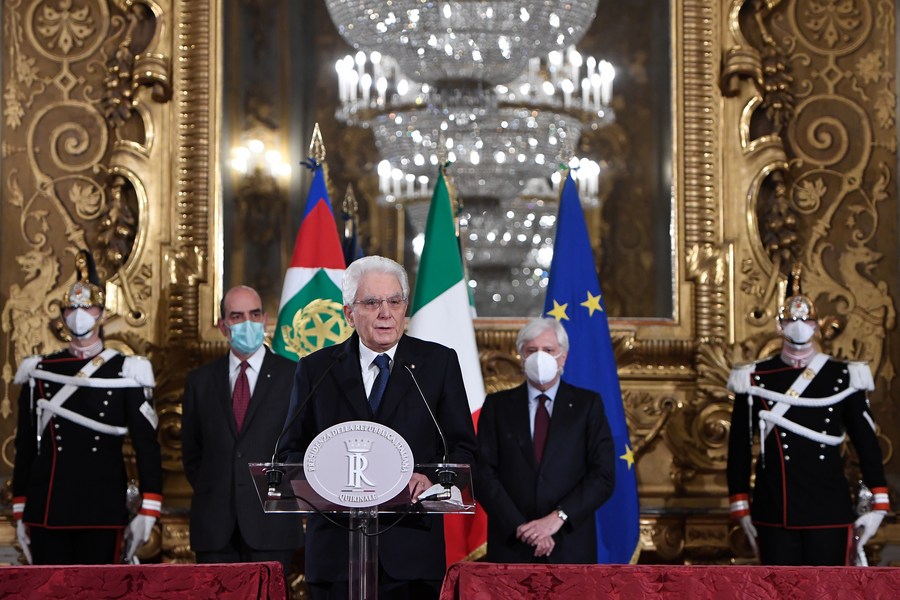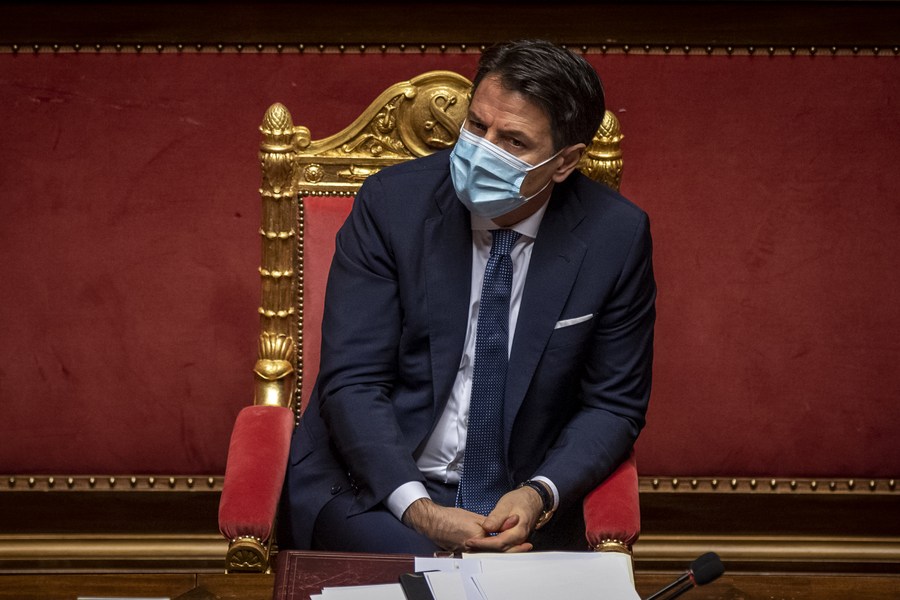


Former chief of European Central Bank (ECB) Mario Draghi speaks to the press at the Palazzo del Quirinale after a meeting with Italian President Sergio Mattarella in Rome, Italy, Feb. 3, 2021. (Pool via Xinhua)
"This is a difficult moment," Draghi acknowledged in a short declaration after being appointed. "Winning over the pandemic, completing the vaccination campaign, providing answers to the citizens' immediate problems, and re-launching the economy are the challenges we face."
ROME, Feb. 3 (Xinhua) -- Former chief of European Central Bank (ECB) Mario Draghi was appointed to form Italy's new government, the office of President Sergio Mattarella said on Wednesday.
"This morning, the president of the Republic has received professor Mario Draghi, to whom he has assigned the task of forming a new government," Secretary-General of the Italian Presidency Ugo Zampetti told a press conference.
The appointment came after Draghi met with Mattarella for over one hour at the Quirinale Palace. A day earlier, exploratory talks to recompose the previous government failed.

Former chief of European Central Bank (ECB) Mario Draghi (L) arrives at the Palazzo del Quirinale for a meeting with Italian President Sergio Mattarella in Rome, Italy, Feb. 3, 2021. (Pool via Xinhua)
Draghi will be tasked with forming a non-political cabinet with the largest possible support in parliament to lead Italy in the next crucial months.
"This is a difficult moment," Draghi acknowledged in a short declaration after being appointed. "Winning over the pandemic, completing the vaccination campaign, providing answers to the citizens' immediate problems, and re-launching the economy are the challenges we face."
Mattarella told a press conference on Tuesday that he would confer a mandate to form a "non-partisan government."

Italian President Sergio Mattarella (Front) speaks to the media at the Quirinale Palace in Rome, Italy, Feb. 2, 2021. (Pool via Xinhua)
The president explained that Italy can't afford snap elections right now because it needs a fully functioning government that can fight the pandemic and also submit a national Recovery Plan to the European Union (EU) by April.
Former Prime Minister Giuseppe Conte had to resign in late January, despite surviving two confidence votes in parliament after former premier Matteo Renzi decided to pull his Italia Viva party from the governing coalition.
According to local media, Renzi's decision was out of disagreement over the government's handling of the pandemic and of the multi-billion-euro EU funding for Italy.

Italian Prime Minister Giuseppe Conte attends a debate ahead of a confidence vote in Senate in Rome, Italy, Jan. 19, 2021. (Pool via Xinhua)

 Award-winning photos show poverty reduction achievements in NE China's Jilin province
Award-winning photos show poverty reduction achievements in NE China's Jilin province People dance to greet advent of New Year in Ameiqituo Town, Guizhou
People dance to greet advent of New Year in Ameiqituo Town, Guizhou Fire brigade in Shanghai holds group wedding
Fire brigade in Shanghai holds group wedding Tourists enjoy ice sculptures in Datan Town, north China
Tourists enjoy ice sculptures in Datan Town, north China Sunset scenery of Dayan Pagoda in Xi'an
Sunset scenery of Dayan Pagoda in Xi'an Tourists have fun at scenic spot in Nanlong Town, NW China
Tourists have fun at scenic spot in Nanlong Town, NW China Harbin attracts tourists by making best use of ice in winter
Harbin attracts tourists by making best use of ice in winter In pics: FIS Alpine Ski Women's World Cup Slalom
In pics: FIS Alpine Ski Women's World Cup Slalom Black-necked cranes rest at reservoir in Lhunzhub County, Lhasa
Black-necked cranes rest at reservoir in Lhunzhub County, Lhasa China's FAST telescope will be available to foreign scientists in April
China's FAST telescope will be available to foreign scientists in April